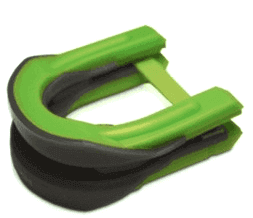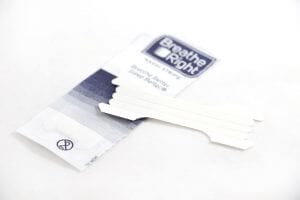Over-the-Counter Sleep Aids and How They Stop Snoring
Are you tired of being told you’re a snorer? Does your partner want to kick you out of bed at night because the can no longer handle the noise? Do your kids and family members regularly make jokes at your expense, about your snoring?
If any of these questions are answered with yes, then you may be among the 45% of adults that suffer from chronic, or long term, snoring. Snoring is an annoying habit which may be a symptom of underlying medical issues.
Because of the commonality of snoring, there are now many safe and effective snoring aids available to help combat the frustrating symptom. It is important to remember, however, to always seek advice from a medical professional to determine if there are any underlying causes of your long-term snoring.
- Tongue Retaining Devices
 Tongue retaining devices, also known as tongue stabilizing devices, are slightly different from the typical mouthpieces you might have seen in the past. These devices work by holding your tongue forward while you sleep. Oftentimes, when you snore, the tongue will fall backward and partially collapse the airway. This causes the turbulent airflow and vibration of the soft tissues surrounding the neck. A tongue retaining device acts as a suction device on the tongue and prevents it from falling backward and obstructing the airway.Most people who use tongue retaining devices to stop snoring report that it is comfortable, after the initial adjustment period. It is also suggested that when used correctly, tongue retaining devices can be up to 80% effective at preventing snoring.Although it is generally a safe and easy device to use, it can cause problems for people who are unable to breathe effectively through their noses. Tongue retaining devices hold the tongue forward, but to breathe, you must breathe in and out through the nose. If you are a person who suffers from a deviated nasal septum, nasal polyps, sinus issues or other problems that inhibit nose breathing, this may not be the best device for you.
Tongue retaining devices, also known as tongue stabilizing devices, are slightly different from the typical mouthpieces you might have seen in the past. These devices work by holding your tongue forward while you sleep. Oftentimes, when you snore, the tongue will fall backward and partially collapse the airway. This causes the turbulent airflow and vibration of the soft tissues surrounding the neck. A tongue retaining device acts as a suction device on the tongue and prevents it from falling backward and obstructing the airway.Most people who use tongue retaining devices to stop snoring report that it is comfortable, after the initial adjustment period. It is also suggested that when used correctly, tongue retaining devices can be up to 80% effective at preventing snoring.Although it is generally a safe and easy device to use, it can cause problems for people who are unable to breathe effectively through their noses. Tongue retaining devices hold the tongue forward, but to breathe, you must breathe in and out through the nose. If you are a person who suffers from a deviated nasal septum, nasal polyps, sinus issues or other problems that inhibit nose breathing, this may not be the best device for you. - Mandibular Advancement Devices
Mandibular advancement devices work slightly differently than tongue retaining devices. These devices look more like the conventional mouthpieces and work by preventing your jaw from falling backward. When your jaw is further backward, it makes it easier for the tongue to fall backward and obstruct and block the airway. Mandibular advancement devices are an effective and comfortable way of holding the jaw forward and protecting the airway from collapsing.Unlike tongue retaining devices, there are many different sizes and shapes of mandibular advancement devices and this can make it difficult to find the right fit unique to your face. Because of the wide range of shapes, however, it is likely you can find a suitable shape for you, if you are willing to attempt some trial and error.There are two main types of mandibular advancement devices: those with airflow holes, and those without airflow holes. The airflow holes are a huge benefit to people who are unable to breathe through the nose because it allows you to wear the device and continue breathing through your mouth. This makes the mandibular advancement device with airflow holes more beneficial than tongue retaining devices in those with problems that inhibit nasal breathing. - Nasal Strips
 Nasal strips are another possible snoring aid. Nasal strips are not always effective; however, they are a quick and easy technique to use as a first line treatment. Nasal strips work by attaching to the nose and helping to hold the nasal passages in an open position. This better allows you to breathe through your nose and creates easier air flow and less work is required for breathing. They are flexible and adhesive nasal strips and are a cheap and easy method to attempt to help stop snoring.
Nasal strips are another possible snoring aid. Nasal strips are not always effective; however, they are a quick and easy technique to use as a first line treatment. Nasal strips work by attaching to the nose and helping to hold the nasal passages in an open position. This better allows you to breathe through your nose and creates easier air flow and less work is required for breathing. They are flexible and adhesive nasal strips and are a cheap and easy method to attempt to help stop snoring. - Humidifier
Although many people do not think to try a humidifier to help stop snoring, it is a useful over-the-counter tool to help prevent snoring. Our throats and nasal passages are naturally coated with mucus, to help keep bad bacteria and viruses from entering the lungs. In drier climates with less humidity, however, this mucus can become thickened and it takes more effort to pass air through these congested and sticky airways. Humidifiers are useful because they add moisture to these airways and prevent the increased work of breathing and stop the snoring that is a result of this extra breathing effort. It will help to moisten the air passageways in both the nasal passages and larger airways in the throat.



 Tongue retaining devices, also known as tongue stabilizing devices, are slightly different from the typical mouthpieces you might have seen in the past. These devices work by holding your tongue forward while you sleep. Oftentimes, when you snore, the tongue will fall backward and partially collapse the airway. This causes the turbulent airflow and vibration of the soft tissues surrounding the neck. A tongue retaining device acts as a suction device on the tongue and prevents it from falling backward and obstructing the airway.Most people who use tongue retaining devices to
Tongue retaining devices, also known as tongue stabilizing devices, are slightly different from the typical mouthpieces you might have seen in the past. These devices work by holding your tongue forward while you sleep. Oftentimes, when you snore, the tongue will fall backward and partially collapse the airway. This causes the turbulent airflow and vibration of the soft tissues surrounding the neck. A tongue retaining device acts as a suction device on the tongue and prevents it from falling backward and obstructing the airway.Most people who use tongue retaining devices to  Nasal strips
Nasal strips